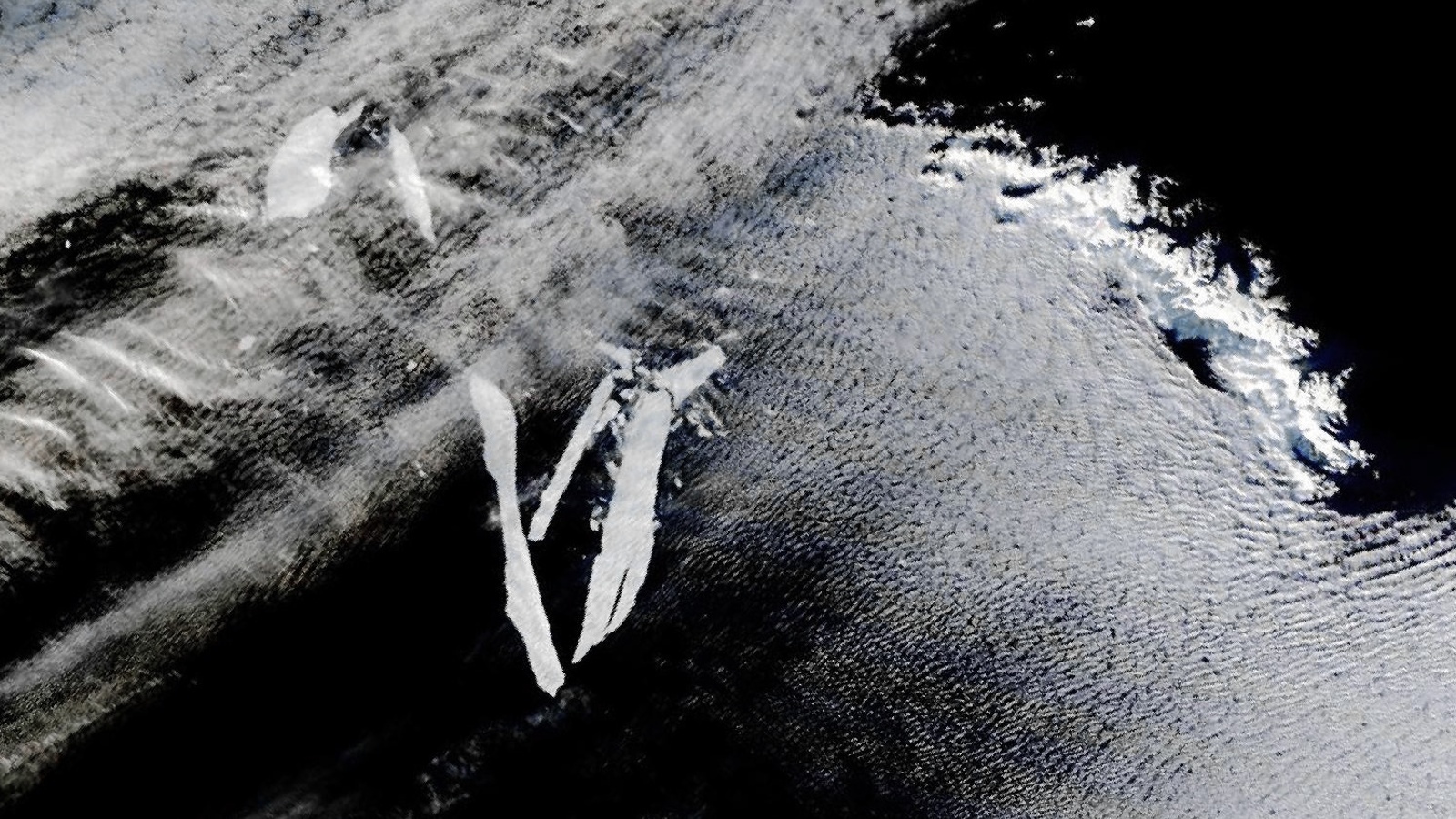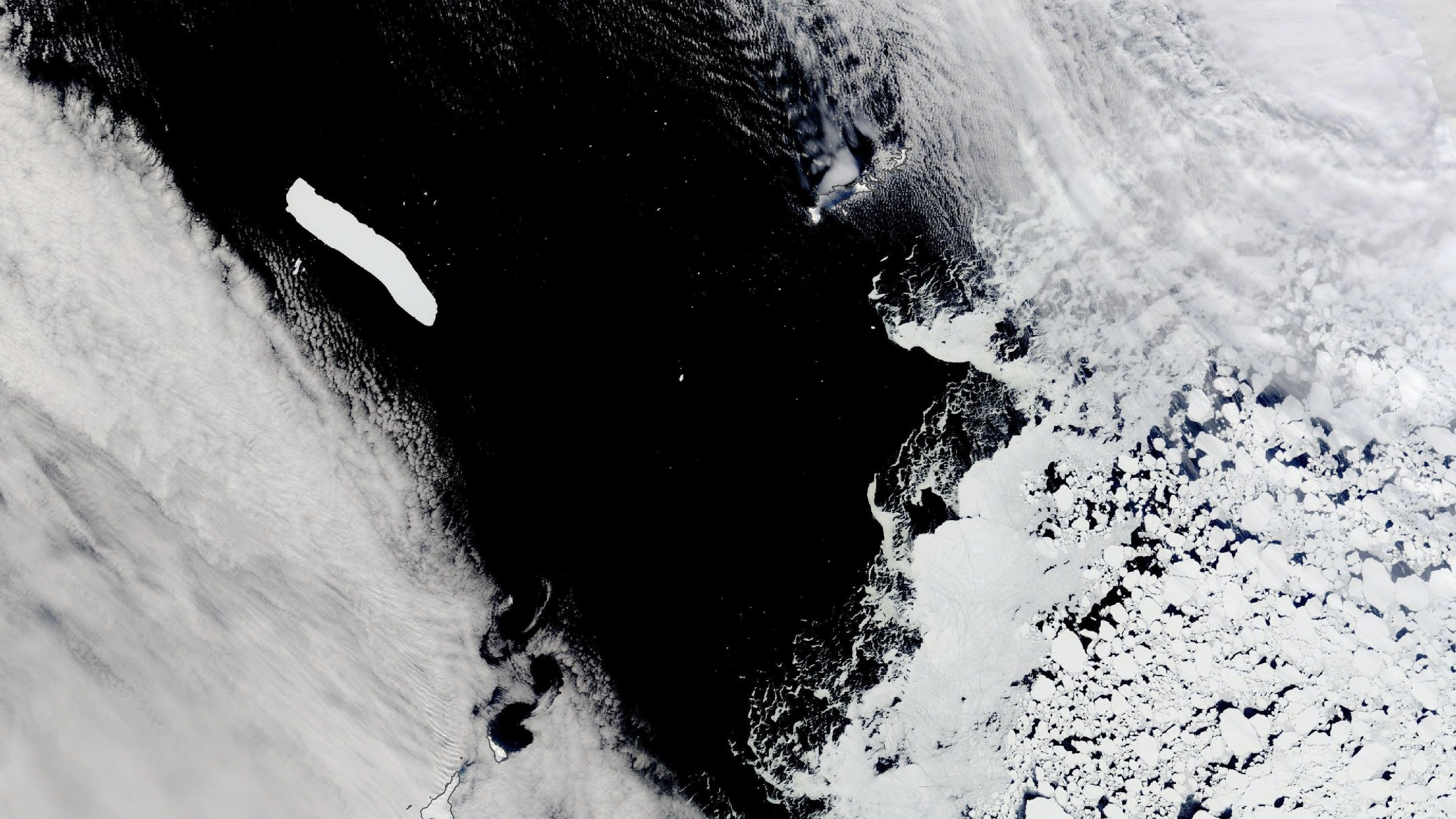World's largest iceberg is no more after being ripped apart in 'iceberg graveyard'
Satellite images show fragments from the enormous iceberg A-76A dispersing near South Georgia island, where the previous world's largest iceberg also met its doom in 2020.

The world's largest iceberg is no more. The enormous chunk of ice, which was around twice the size of Los Angeles, has fractured into multiple city-size slabs, new satellite images show.
The iceberg, known as A-76A, was the largest remaining piece of a Rhode Island-size slab that broke off from Antarctica's Ronne Ice Shelf in May 2021.
In October 2022, satellite images revealed that A-76A, which measured around 84 miles (135 kilometers) long and 16 miles (26 km) wide at the time, had moved into a stretch of water known as the Drake Passage, where icebergs are often swept away from Antarctica by powerful ocean currents.
On May 24, NASA's Terra satellite captured a new image of six sizable chunks of A-76A drifting away from one another near South Georgia island in the Scotia Sea, suggesting that the big berg had fragmented several days prior to the image being captured, according to NASA's Earth Observatory. The iceberg's fragments were around 1,500 miles (2,415 km) from the point where A-76 snapped away from Antarctica in 2021.
"It is impressive to think it 'sailed' that far in about two years," Christopher Shuman, a glaciologist at the University of Maryland and NASA's Goddard Space Flight Center, told NASA Earth Observatory. "That obviously speaks to the force of powerful currents in this part of the Southern Ocean."
Related: Giant phallus-shaped iceberg floating in Conception Bay surprises residents of Dildo, Canada

The world's previous largest iceberg, A-68A, also crumbled near South Georgia in December 2020 after being slingshotted through the Drake Passage.
Sign up for the Live Science daily newsletter now
Get the world’s most fascinating discoveries delivered straight to your inbox.
At the time, conservationists were concerned that the Delaware-size A-68A could end up colliding with South Georgia, which would have put the island's diverse marine ecosystem at risk of collapse. But the hefty berg narrowly missed the island before being ripped in half by ocean currents and later disintegrating into an "alphabet soup" of smaller named icebergs.
A-76A was never on a direct collision course with South Georgia, but it could still end up impacting the nearby marine ecosystem. By the time A-68A had fully melted away in mid 2021, scientists estimated it had dumped around 1 trillion tons (900 million metric tons) of freshwater into the ocean, the majority of which was shed near South Georgia. It's likely that A-76A will also inject large amounts of freshwater into the nearby ocean, which could disrupt marine food webs.
In a statement, Mark Belchier, the director of Fisheries and Environment for South Georgia and the South Sandwich Islands, warned that the new iceberg chunks could be a "major" concern for vessels operating in the region as the mini bergs, which have yet to be individually named, continue to break apart.
South Georgia may have another fragmenting iceberg on its hands in the coming years. In January, an ice slab the size of London, named A-81, was birthed from Antarctica's Brunt Ice Shelf. Research suggests that A-81 could also float into the Drake Passage, which may catapult it toward South Georgia.
A-76A and A-81 are not the only icebergs that have been on the move recently. In October 2022, an iceberg known as B-22A, which is around twice the size of Houston, Texas, began drifting away from Antarctica after spending more than 20 years tethered to the seafloor near the Thwaites Glacier, also known as the "Doomsday Glacier."

Harry is a U.K.-based senior staff writer at Live Science. He studied marine biology at the University of Exeter before training to become a journalist. He covers a wide range of topics including space exploration, planetary science, space weather, climate change, animal behavior and paleontology. His recent work on the solar maximum won "best space submission" at the 2024 Aerospace Media Awards and was shortlisted in the "top scoop" category at the NCTJ Awards for Excellence in 2023. He also writes Live Science's weekly Earth from space series.










